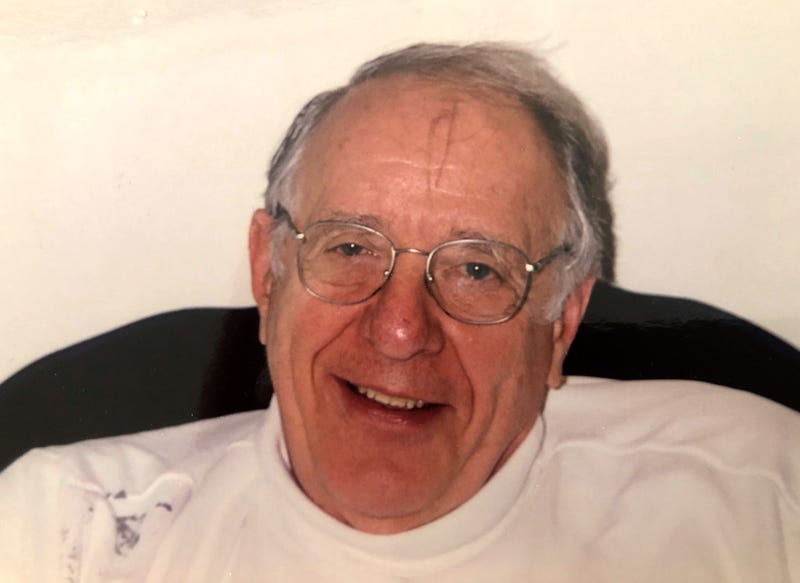
PHILADELPHIA (KYW Newsradio) — Rev. Theodore Loder, the longtime pastor of First United Methodist Church of Germantown (FUMCOG) and a champion of causes from civil rights to same-sex marriage, has died at the age of 90.
He was also the author of eight books and well known as a dynamic preacher and inventive thinker.
Loder arrived at FUMCOG in 1962, a cum laude graduate of Yale Divinity School, with radical new ideas about worship and the duties and practice of Christian faith. He found a perfect match in what remained of the congregation. Many affluent, white parishioners had fled to the suburbs and those who stayed were commited to remaining involved in the changing community.
Loder called it "faith in action."
In 1965, he recruited members to go with him to Selma to march with Dr. Martin Luther King Jr. FUMCOG was in the vanguard of celebrating King's birthday, inviting guest speakers such as Fred Shuttlesworth, Maynard Jackson and Fred Gray for MLK Sunday. It joined with a nearby Black Methodist church to diversify the congregation.
Loder and his parish were also active in the anti-Vietnam War and anti-nuclear movements, all while establishing several mission-oriented nonprofits offering housing, job training and medical care. Covenant House Medical Services still runs a free clinic in Germantown and Germantown Interfaith Housing continues to provide affordable apartments for seniors.
In 1984, Loder helped bring the Sanctuary movement to Philadelphia, opening the church to a Guatemalan family to keep them from being deported and helping them gain legal refugee status.
In 1990, Loder persuaded FUMCOG to become a Reconciling Congregation, to welcome LGBTQ members despite the Methodist Church's official position that homosexuality was incompatible with church teaching. He personally flouted church doctrine by presiding over religious services for same sex couples.
Through the '90s, FUMCOG, under Loder's leadership, pursued international social justice, sending a delegation to Haiti after the coup against Jean-Bertrand Aristide and a delegation to South Africa to observe that country’s first all-race election.
Loder, though, was known as much for his powerful sermons and creative worship as for his social activism. He would weave poetry, philosophy, biblical passages, literary allusions and dad jokes into what were often half-hour long discourses on the difficulty and mystery of faith, on the struggle to do the right thing and the redemption that follows the failure that is inevitable for mere mortals.
"He was a poet at heart," said his son, Tom, recalling the hours his father spent fashioning his sermons. "He had a searching soul."
On some Sundays, Loder would forgo the sermon and present a dramatic monologue in the character of a shepherd at the Nativity, for example, or he would produce a full-scale play.
Loder wrote his own prayers, which are the basis for several of his books, including "Guerrillas of Grace," a popular resource for clergy of many denominations.
"Lord, I have so few ways to pray," he writes in one, "but you have so many ways to answer. Keep me alert to your unpredictable answers, to your unexplainable surprises."
Loder was delighted when a 1996 Inquirer Magazine article dubbed FUMCOG the "Oddball Church." He was quoted in the article as eschewing the term "progressive" to describe his ministry.
"What I believe is that the tradition of the gospel is to love God and to love our neighbors as ourselves," he told the magazine.
"It's a triangle, and if you leave any part out, you tend to get off-track. So if 'progressive' means loving your neighbor - or your perceived enemy - for the love of God, then I suppose the term is apt. I prefer to think of our work as a Christian response to the world."
Loder retired from FUMCOG in 2000.
His son finds it fitting that his father died on Maundy Thursday, the Holy Week commemoration of Christ’s commandment to his apostles to "Love one another."
In addition to Tom, Loder is survived by his wife, Jan Filing, daughter Karen, sons Mark and David, stepsons Chris and Jon Long, eight grandchildren and four step-grandchildren. Tom says the family hopes to hold an in-person memorial in the fall.
